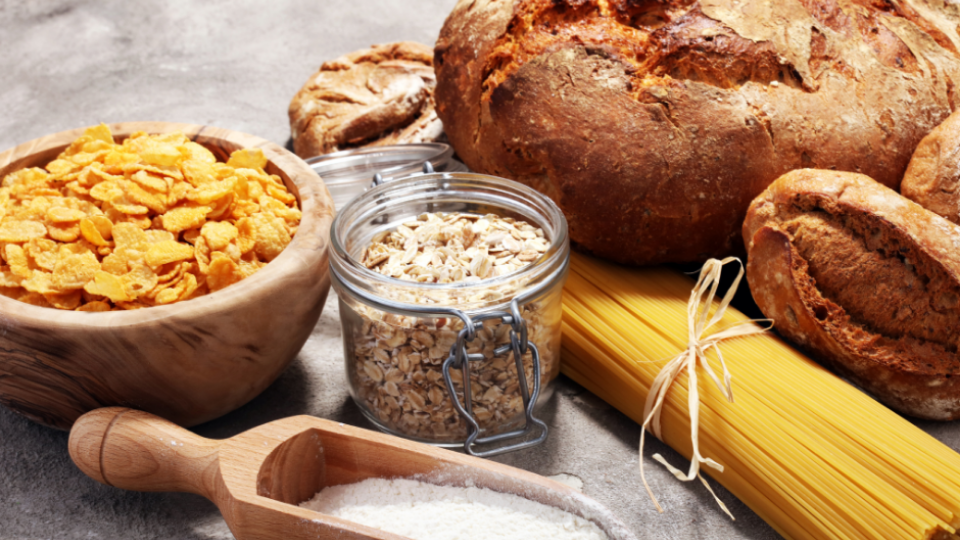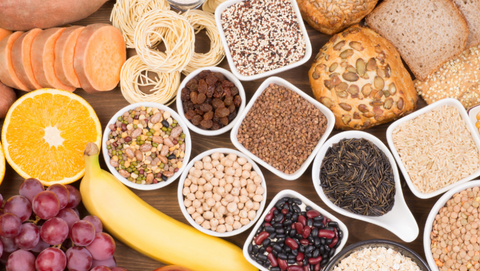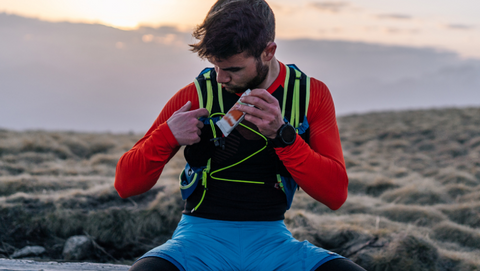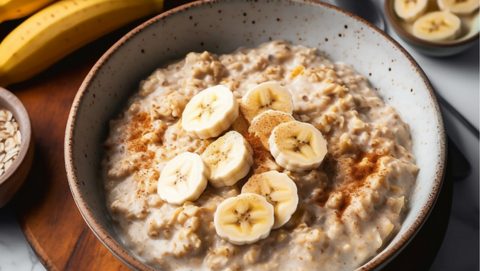Prioritizing Carbohydrates: A Guide for Endurance Runners

Carbohydrates are very important nutrient to an endurance runner. A runner’s carbohydrate intake can make or break their endurance performance. Research shows that up to 80% of endurance runners do not eat enough carbohydrates to support their increased needs. To address this issue, this article further examines the basics of carbohydrates, the effects carbohydrates have on endurance performance, current recommendations, and tips for maximizing carbohydrate intake.
What are Carbohydrates?
Carbohydrates are a macronutrient, composed of glucose molecules. Glucose is the simplest form of sugar. It acts as the body’s primary source of energy and the brain’s preferred source of energy.
Carbohydrates are typically classified as either simple or complex depending upon their chemical structures.
Simple carbohydrates, identified by their short chains of glucose molecules, can be broken down and absorbed by the body very quickly. Thus, simple carbohydrates provide our bodies with rapid bursts of energy shortly after ingestion. See Table 1 for examples of food sources of simple carbohydrates. Although simple carbohydrates often get a bad reputation, they are ideal in situations that require immediate sources of energy such as during endurance exercise.

Complex carbohydrates, characterized by their longer glucose molecule chains, take the body more time to break down. Because of this, complex carbohydrates do not spike our blood sugar as quickly as simple carbohydrates. They provide longer lasting energy to our bodies, once absorbed. See Table 1 for examples of food sources of complex carbohydrates.
Complex carbohydrates are more nutrient-dense than most simple carbohydrates because they contain fiber, vitamins, and minerals. Fiber is a type of carbohydrate, found in plant-based foods, that cannot be digested by the body. Fiber is recommended as part of a nutritious diet because it has numerous benefits including promoting digestive health, regulating bowel movements, lowering cholesterol, and controlling blood glucose levels. While there are many benefits to eating fiber-rich diet, endurance runners are often instructed to avoid eating fiber right before a run because it can cause gut distress during exercise.
Table 1. Food sources of simple carbohydrates, complex carbohydrates, and ideal carbohydrates for runners
|
Type of Carbohydrate |
Food Sources |
Ideal Food Sources for Runners |
|---|---|---|
|
Simple Carbohydrates |
· White bread · White rice · White pasta · Crackers · Chips · Breakfast cereals · Sugar sweetened beverages (soda, juice, sports drinks, energy drinks, coffee, tea, etc.) · Baked goods · Chocolate · Candy · Honey · Dried fruit · Canned fruit · Dairy (yogurt, milk, ice cream) · Ripe bananas and mangoes |
· White bread · White rice · White pasta · Rice cakes · Honey · Dried fruit · Yogurt · Milk · Ripe bananas · Ripe mangoes
Simple carbohydrates that can be beneficial to consume right before or during a race solely for energy but are less nutritious:
· Sports drinks · Candy · Crackers · Breakfast cereals · Carbohydrate/electrolyte gels and gummies |
|
Complex Carbohydrates |
· Whole grain bread · Brown rice · Whole grain pasta · Whole grains (oats, quinoa, barley, etc.) · Beans · Lentils · Starchy vegetables (potatoes, sweet potatoes, squash, etc.) · Fiber-rich fruits (berries, apples, oranges, less ripe bananas, less ripe mangoes, etc.) · Fiber-rich vegetables (broccoli, leafy greens, carrots, etc.) |
All complex carbohydrates can be included in a nutritious diet for runners. However, the timing of intake for these foods depends on exercise timing. This will be discussed in further detail later in this article.
Complex carbohydrates that can be combined with simple carbohydrates during a pre-exercise meal/snack:
· Lower fiber fruits (berries, oranges, less ripe bananas, etc.) · Oats · Starchy vegetables (remove the skins to reduce the fiber content) · Whole grain bread · Whole grain pasta |
In summary, carbohydrates are made of glucose, which acts as the primary source of energy for our bodies. Carbohydrates are the main macronutrient responsible for sustaining individuals through endurance exercise. Complex carbohydrates are an essential component of a nutritious diet and should be eaten daily to benefit an individual’s overall health. However, it is important that runners also prioritize intake of simple carbohydrates to fuel endurance exercise and enhance performance. This topic will be discussed in greater detail throughout the remainder of this article.
Carbohydrates and Endurance Performance
After eating carbohydrate-rich foods, our bodies break down the carbohydrates into glucose. Our body can then use the glucose immediately for energy or store the glucose as glycogen for later use. Glycogen is stored primarily in the muscles and liver; however, it is stored in small amounts in the brain too.
During prolonged and intense exercise, our bodies rely upon muscle and liver glycogen to provide the energy necessary to maintain performance. If a runner’s muscle glycogen stores become depleted before the end of a race, their pace will slow significantly. This is often referred to as “bonking” or “hitting the wall”. With this in mind, it is essential that runners eat enough carbohydrates before and during exercise to maintain their performance.
Carbohydrates also play an important role in recovery by replenishing the body’s glycogen stores. Eating enough carbohydrate-rich foods shortly after exercise is associated with easing body soreness, assisting with muscle repair, and allowing runners to return to exercise as soon as possible. Adequate carbohydrate intake should be prioritized not only during training and competition, but throughout recovery as well.
Carbohydrate Recommendations for Endurance Runners

Carbohydrate recommendations for endurance runners vary depending on daily exercise level and phase of exercise (before, during, or after). To assist you in determining where your general carbohydrate intake should be, Table 2 summarizes daily recommendations based upon your exercise level.
Table 2. Daily carbohydrate recommendations for endurance runners
|
Exercise level |
Daily Carbohydrate Recommendation |
|---|---|
|
Light, low-intensity exercise |
3-5 grams (g) of carbohydrates per kilogram (kg) of body weight |
|
Moderate-intensity exercise lasting roughly 1 hour each day |
5-7 g carbohydrate/kg body weight |
|
Moderate- to high-intensity exercise lasting 1 to 3 hours each day |
6-10 g carbohydrate/kg body weight |
|
Moderate to high-intensity exercise lasting 4 to 5 hours each day |
8-12 g carbohydrate/kg body weight |
In addition to knowing the recommendation for your daily carbohydrate intake, it is also important to determine specific carbohydrate needs before, during, and after exercise if you want to enhance your endurance performance.
Before Exercise
Runners should consume carbohydrates roughly one to four hours before exercise to maximize glycogen stores. Table 3 provides guidelines on pre-exercise meal timing and the associated carbohydrate recommendation.
Please note, the table is not instructing you to eat carbohydrates every hour for four hours before exercise. Rather, this table is a tool to show you how many carbohydrates to incorporate into your pre-exercise meal depending on when you choose to eat it.
If your pre-exercise meal is one to four hours before exercise, it is recommended to consume a combination of simple and complex carbohydrates. Simple carbohydrates will provide your body with quick energy to help fuel the beginning of your run, while complex carbohydrates will take longer to digest and provide your body with energy later on in your run. Ultimately, this combination will allow your energy levels to remain high for exercise.
f your pre-exercise meal is less than an hour before exercise, simple carbohydrates are the best choice to not only to provide quick energy, but also because high-fiber, complex carbohydrates can upset the gastrointestinal system during exercise. However, if you experience low blood sugar levels after eating simple carbohydrates within an hour of exercise, stick to eating complex carbohydrates regardless of the timing of your pre-exercise meal.
Table 3. Carbohydrate recommendations before exercise
|
Timing of Pre-Exercise Meal |
Carbohydrate Recommendation |
|---|---|
|
1 hour before exercise |
1 g carbohydrate/kg body weight |
|
2 hours before exercise |
2 g carbohydrate/kg body weight |
|
3 hours before exercise |
3 g carbohydrate/kg body weight |
|
4 hours before exercise |
4 g carbohydrate/kg body weight |
In some cases, it is not realistic to eat a pre-exercise meal one to four hours before exercise. This is common for runners who exercise early in the morning. If you have less than one hour before exercise to eat, it is recommended that you consume 30 g of simple carbohydrates before you begin.
Calculating your carbohydrate recommendation before exercise can be tricky if you have not done it before. Table 4 provides examples of how to complete these calculations and create corresponding pre-exercise meals.
Table 4. Examples of calculating and meeting pre-exercise carbohydrate needs for runners
|
Example Calculation |
Corresponding Pre-Exercise Meal |
|---|---|
|
To calculate the pre-exercise carbohydrate needs for a 130-pound (lb) runner, we have to first convert lbs to kgs. To do this, we take 130 and divide by 2.2 because there are 2.2 lbs in 1 kg.
130/2.2 = 59.1 kgs
Then, we have to determine when this runner will eat their pre-exercise meal. For this example, we will use 2 hours.
Next, we take the runner’s weight of 59.1 kgs and multiply it by the pre-exercise carbohydrate recommendation for 2 hours which is 2 g of carbohydrates per kg of body weight.
59.1 kgs x 2 g carbohydrates/kg body weight = 118.2 g carbohydrate
This runner needs to eat about 120 g of carbohydrates 2 hours before exercise. |
· 2 cups of cooked oats sweetened with 1 tablespoon of honey and topped with ½ cup of berries · 1 banana · 1 cup (8 oz) 1% milk
Total carbohydrates: 116 g |
|
To calculate the pre-exercise carbohydrate needs for a 180 lb runner, we have to first convert lbs to kgs. To do this, we take 180 and divide by 2.2 because there are 2.2 lbs in 1 kg.
180/2.2 = 81.8 kgs
Then, we have to determine when this runner will eat their pre-exercise meal. For this example, we will use 3 hours.
Next, we take the runner’s weight of 81.8 kgs and multiply it by the pre-exercise carbohydrate recommendation for 3 hours which is 3 g of carbohydrates per kg of body weight.
81.8 kgs x 3 g carbohydrates/kg body weight = 245.4 g carbohydrates
This runner needs to eat about 245 g of carbohydrates 3 hours before exercise. |
Burrito bowl: · 2 cups of cooked white rice · 1 cup of beans · ½ cup pico de gallo · ½ cup peppers and onions
Served with a side of 2 cups (16 oz) 1% milk.
Total carbohydrates: 241 g |
During Exercise
Carbohydrate intake during exercise is dependent upon the level and duration of exercise. Table 5 shows the carbohydrate recommendations for during exercise based on the different exercise levels and durations. Because carbohydrate intake during exercise is meant to provide immediate energy, runners should prioritize the consumption of simple carbohydrates during this time.
Table 5. Carbohydrate recommendations during exercise
|
Duration of Exercise |
Carbohydrate Recommendation |
|---|---|
|
Exercise lasting less than 30 minutes |
Carbohydrate intake during exercise is unnecessary. |
|
Exercise lasting 30 to 75 minutes |
Can consume a small amount (less than 30 g) of simple carbohydrates during exercise if desired. This would look like a few sips of sports drink. |
|
Endurance exercise lasting 1 to 2 hours |
30 g simple carbohydrate/hour |
|
Endurance exercise lasting 2 to 3 hours |
60 g simple carbohydrate/hour |
|
Endurance exercise lasting 3 hours or more |
90 g simple carbohydrate/hour |
After Exercise

To replenish glycogen stores, it is recommended that endurance runners consume 1 to 1.2 g of carbohydrate per kg of body weight per hour for 4 hours following prolonged exercise. For quick recovery, runners should prioritize carbohydrate intake as soon as possible after exercising. In striving to meet the after-exercise carbohydrate recommendation, research has shown that muscle glycogen stores are replenished faster when an individual consumes smaller amounts of carbohydrates every 15 to 30 minutes through a 4-hour period rather than one large meal.
During recovery, it is best to refuel with nutrient-dense carbohydrates, mainly complex carbohydrates, to promote overall health and well-being. However, if you have limited recovery time between exercise, you should prioritize simple carbohydrate intake to maximize glycogen storage in a shorter amount of time. Table 6 summarizes carbohydrate recommendations for recovery and provides an example of how to implement this information.
Table 6. Carbohydrate recommendations and implementation for recovery
|
Carbohydrate Recommendation |
Example Calculation |
Recovery Snacks to Meet Carbohydrate Needs |
|---|---|---|
|
For 4 hours following endurance exercise, runners should consume 1 to 1.2 g of carbohydrates/kg of body weight/hour. |
To calculate recovery carbohydrate needs for a 150-pound (lb) runner, we have to first convert lbs to kgs. To do this, we take 150 and divide by 2.2 because there are 2.2 lbs in 1 kg.
150/2.2 = 68.2 kgs
Then, we take 68.2 kgs and multiply it by the recovery carbohydrate recommendation which is 1 to 1.2 g of carbohydrates per kg of body weight per hour for 4 hours.
68.2 kgs x 1-1.2 g carbohydrates/kg body weight x 4 hours = 272.8 to 327.4 g of carbohydrate
This runner needs to eat between 270 to 330 g of carbohydrates during the first four hours after exercise.
Following the recommendation to break this large amount of carbohydrate into smaller amounts, this runner will choose to eat carbohydrates every 30 minutes for 4 hours. Because there are 8-30 minutes periods in 4 hours, we will divide the range of 270 to 330 g of carbohydrates by 8.
270-300 g carbohydrates/8 eating periods = 33.8 to 41.3 g of carbohydrates
Overall, this runner needs to eat about 35 to 40 grams of carbohydrates every 30 minutes for 4 hours to meet their needs. |
The following recovery snack ideas contain between 35 to 40 g of carbohydrates each:
· 1 ½ cups of 1% chocolate milk
· 1 piece of whole grain toast topped with 1 tablespoon of peanut butter and a banana
· 1 fruit cup and a mozzarella cheese stick
· ¾ cup of cooked pasta topped with ⅓ cup marinara sauce and 2 oz ground beef
· Turkey wrap (1 whole wheat tortilla, 2 oz turkey, 1 slice of cheese, vegetables of choice). Eat with ½ cup of berries. |
Carbohydrate Loading
Carbohydrate loading is a common strategy used by endurance runners to maximize their glycogen stores leading up to competition. Research has shown that carbohydrate loading can improve endurance performance by up to 3%, allowing runners to endure higher physical loads without fatigue. Currently, it is recommended that carbohydrate loading take place 36 to 48 hours prior to competition. During these two days, it is advised that endurance runners rest from exercise and consume 10 to 12 grams of carbohydrate per kilogram of body weight each day to enhance glycogen stores.
Individuals are encouraged to focus intake primarily on simple carbohydrates during all meals and snacks these 2 days to avoid any gastrointestinal distress that may be caused by overconsumption of fiber-rich foods. During this carbohydrate loading period, runners are encouraged to eat foods such as white rice, white pasta, white bread, smoothies, fruit, cereal, yogurt, and low-fat sweets. Many runners feel stiff or heavy after carbohydrate loading due to increases in their glycogen storage, but these feelings will fade with exercise.
Once competition day arrives, runners should then follow the carbohydrate recommendations provided above for each phase of exercise. If you are interested in implementing carbohydrate loading into your pre-competition nutrition regimen, consider testing it in training first to determine how it affects your body, allowing you to fine-tune your approach for race day.
Tips and Tricks to Meet Carbohydrate Recommendations
If you have ever tried to meet high carbohydrate recommendations in the past, you probably already know that eating enough carbohydrates to support endurance exercise can be difficult. Here are some tips and tricks to help you throughout this process:
- Start increasing your carbohydrate intake gradually! It is not likely that you will be able to meet these recommendations consistently on your first try, but your gut can be trained over time. Use race training to slowly increase your carbohydrate intake as tolerated until you meet the carbohydrate recommendations.
- Always try to eat carbohydrates before a morning run/race. Liver glycogen stores become depleted overnight, requiring carbohydrates to be replenished for optimal performance. If you cannot tolerate food in the morning, eat a carbohydrate-rich snack right before you go to bed the night before.
- Add beverages with carbohydrates – sports drinks, chocolate milk, etc. – to your diet during times when carbohydrate needs are high (before exercise, during exercise, and during periods of carbohydrate loading). Trying to consume enough carbohydrates from food alone to meet increased needs will likely be uncomfortable and unbearable.
- Right before a race, try eating a food source of simple carbohydrates. It does not have to be a substantial meal or snack – just something small to give you a quick burst of energy. A banana, applesauce, candy, pretzels, fruit snacks, goldfish, or a few sips of sports drink will do the trick.
- If you cannot tolerate eating or drinking carbohydrates while running, you can try swishing with a carbohydrate beverage and spitting it out. This method has proven to be more effective than completely avoiding carbohydrates during a race.
- Pairing carbohydrates with protein for a post-exercise snack/meal is best for replenishing muscle glycogen stores and promoting muscle repair. The recommendation is typically a 3:1 ratio of grams of carbohydrates to grams of protein. Chocolate milk is a great recovery drink because it has this 3:1 ratio.
- If you cannot or do not want to eat soon after exercise, drink a carbohydrate-containing beverage or shake to jumpstart recovery. Once your stomach settles and your appetite returns, you can eat carbohydrate- and protein-rich recovery snacks/meals.
- If monitoring your carbohydrate intake by grams is too time consuming or overwhelming, you can try the plate method. On intense exercise days, strive to make half of your plate carbohydrates during meals. When exercise is light, you can reduce the amount of carbohydrates to take up a fourth of your plate during meals instead.
References
- American Heart Association. (2018, April 16). Carbohydrates. https://www.heart.org/en/healthy-living/healthy-eating/eat-smart/nutrition-basics/carbohydrates
- Baranauskas, M., Stukas, R., Tubelis, L., Žagminas, K., Šurkienė, G., Švedas, E., Giedraitis, V. R., Dobrovolskij, V., & Abaravičius, J. A. (2015). Nutritional habits among high-performance endurance athletes. Medicina, 51(6), 351–362. https://doi.org/10.1016/j.medici.2015.11.004
- Cleveland Clinic. (2022, July 13). Glycogen. https://my.clevelandclinic.org/health/articles/23509-glycogen
- Jeukendrup, A.E., Jentjens, R.L.P.G., & Moseley, L. (2005). Nutritional Considerations in Triathlon. Sports Med 35, 163–181. https://doi.org/10.2165/00007256-200535020-00005
- Karpinski, C., & Rosenbloom, C. A. (Eds.). (2017). Rosenbloom CA. Sports nutrition: A Handbook for Professionals. (6th ed.). Academy of Nutrition and Dietetics.
- MedlinePlus. (2022, January 17). Carbohydrates. https://medlineplus.gov/carbohydrates.html
- Mielgo-Ayuso, J., Calleja-González, J., Refoyo, I., León-Guereño, P., Cordova, A., & Del Coso, J. (2020). Exercise-Induced Muscle Damage and Cardiac Stress During a Marathon Could be Associated with Dietary Intake During the Week Before the Race. Nutrients, 12(2), 316. https://doi.org/10.3390/nu12020316
- Slavin, J., & Carlson, J. (2014). Carbohydrates. Advances in nutrition (Bethesda, Md.), 5(6), 760—761. https://doi.org/10.3945/an.114.006163
- Thomas, D. T., Erdman, K. A., & Burke, L. M. (2016). Position of the Academy of Nutrition and Dietetics, Dietitians of Canada, and the American College of Sports Medicine: Nutrition and Athletic Performance. Journal of the Academy of Nutrition and Dietetics, 116(3), 501-528. https://doi.org/10.1016/j.jand.2015.12.006
Authors
Madison Gunter, RD, Master of Public Health Student
Jenna Dyckman, RD, MS, Extension Assistant Professor

Madison Gunter


